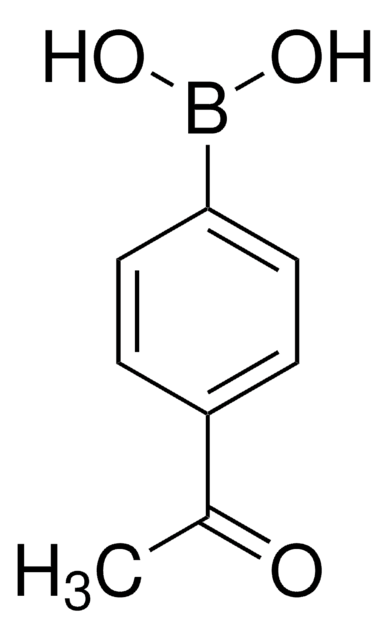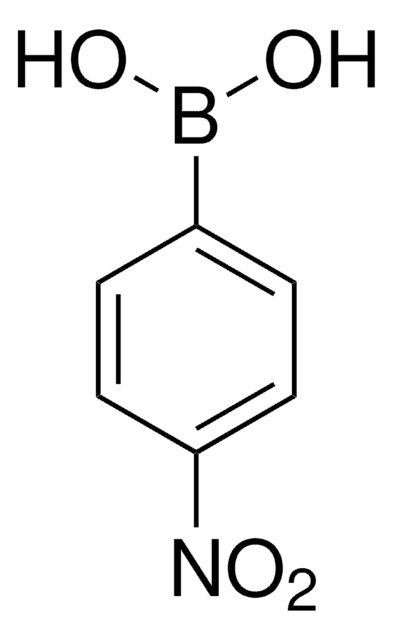417556
4-Fluorophenylboronic acid
≥95%
Synonym(s):
(4-Fluorophenyl)boric acid, (4-Fluorophenyl)dihydroxyborane, (4-Fluorophenyl)dihydroxyboron, (p-Fluorophenyl)boric acid, 4-Fluorobenzeneboronic acid, p-Fluorobenzylboronic acid, p-Fluorophenylboronic acid, NSC 142683
About This Item
Recommended Products
Assay
≥95%
form
powder
mp
262-265 °C (lit.)
SMILES string
OB(O)c1ccc(F)cc1
InChI
1S/C6H6BFO2/c8-6-3-1-5(2-4-6)7(9)10/h1-4,9-10H
InChI key
LBUNNMJLXWQQBY-UHFFFAOYSA-N
Looking for similar products? Visit Product Comparison Guide
Related Categories
Application
It can also be used as a reactant in:
- Suzuki coupling using microwave and triton B catalyst.
- Pd-catalyzed direct arylation of pyrazoles with phenylboronic acids.
- Mizoroki-Heck and Suzuki-Miyaura coupling reactions catalyzed by palladium nanoparticles.
- Cu-catalyzed Petasis reactions.
- Tandem-type Pd(II)-catalyzed oxidative Heck reaction and intramolecular C-H amidation sequence.
- Ruthenium catalyzed direct arylation.
- Rh-catalyzed asymmetric conjugate additions.
- Ligand-free copper-catalyzed coupling of nitro arenes with arylboronic acids.
- Regioselective arylation and alkynylation by Suzuki-Miyaura and Sonogashira cross-coupling reactions.
- Suzuki cross-coupling of tetrabromothiophene.
- Palladium-catalyzed addition to nitriles.
Other Notes
Signal Word
Warning
Hazard Statements
Precautionary Statements
Hazard Classifications
Acute Tox. 4 Oral - Eye Irrit. 2 - Skin Irrit. 2 - STOT SE 3
Target Organs
Respiratory system
Storage Class Code
11 - Combustible Solids
WGK
WGK 3
Flash Point(F)
Not applicable
Flash Point(C)
Not applicable
Personal Protective Equipment
Certificates of Analysis (COA)
Search for Certificates of Analysis (COA) by entering the products Lot/Batch Number. Lot and Batch Numbers can be found on a product’s label following the words ‘Lot’ or ‘Batch’.
Already Own This Product?
Find documentation for the products that you have recently purchased in the Document Library.
Customers Also Viewed
Our team of scientists has experience in all areas of research including Life Science, Material Science, Chemical Synthesis, Chromatography, Analytical and many others.
Contact Technical Service












